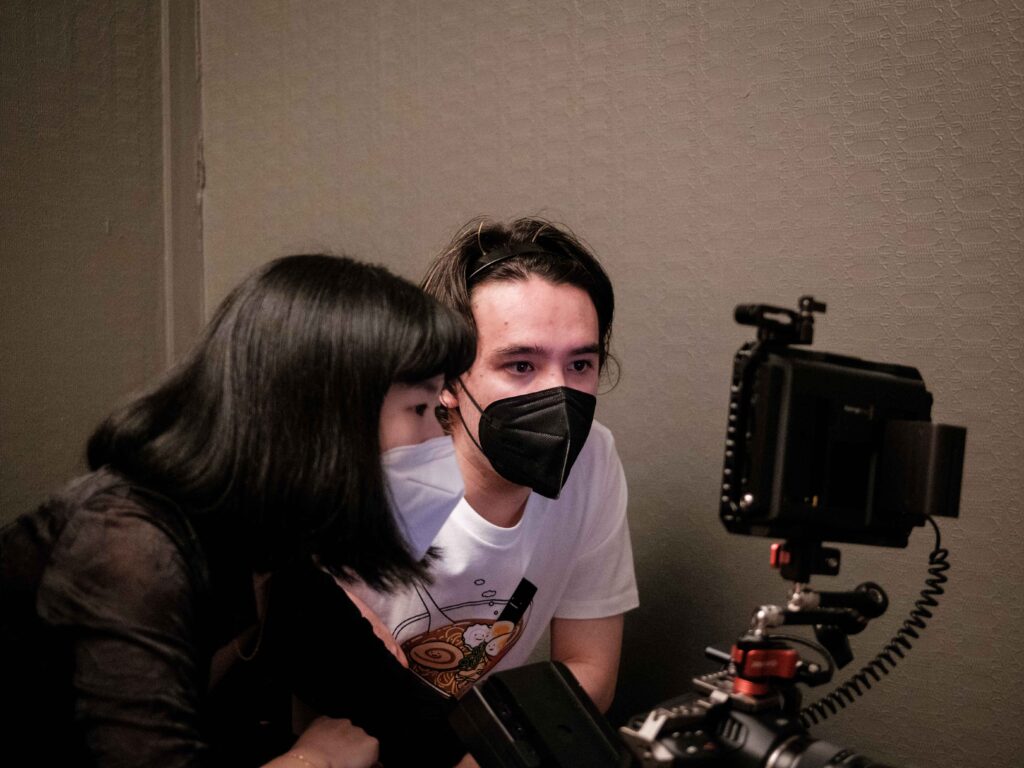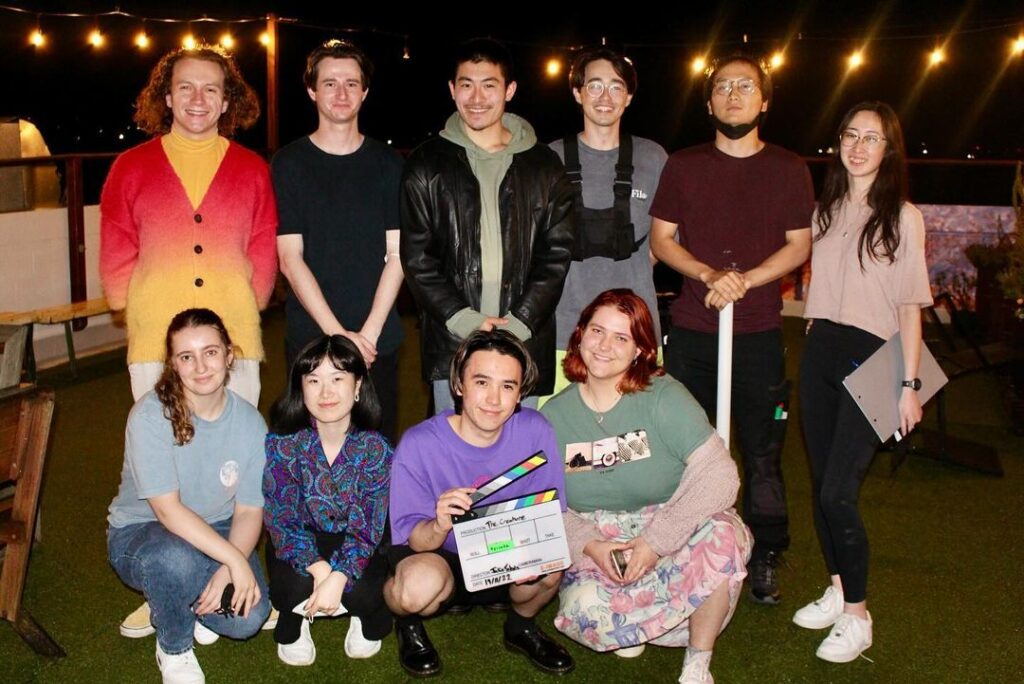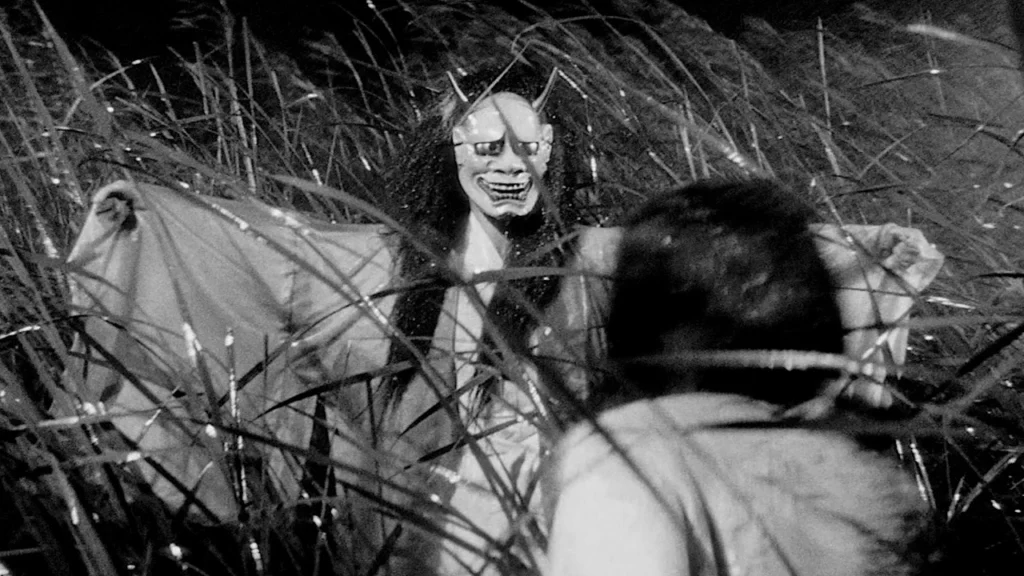Let’s start from the beginning.
In 2022, Jake Tabata (writer/director/actor and digital marketing side-hustler) was ready to take the necessary leap all emerging artists must do—emerge. At the same time, funding for new practitioners was becoming increasingly hard to come by. So through a scrappy crowdfunding campaign, a crew/cast callout for fresh creatives, and the need to make something meaningful, The Creature was born. A short ‘n’ sweet web series released last month (International Pride Month! Slay!), it’s a necessary watch for anyone who’s suffered from relationship anxiety and the perils of online dating.
Before recording, Jake jokes that this piece would just be a vanity piece for me – a nod to the fact Jake starred in the 2021 staging of Yang/Young/杨, a play I co-wrote with Sherry Zhang. I remember at the time gender-bending and retro-fitting scenes for Jake as the scene-stealing Micky, as well as joyously watching many of the Yang/Young/杨 team become friends, future collaborators and great creatives in their own right.
Hot off the release of The Creature, I bravely put my vanity aside and talk exclusively about Jake and Jake’s project only. Between croissant and pie mouthfuls, we chat crowdfunding challenges, community-led creative kaupapa, and dating on Strava.
Note: this interview has been edited and condensed for clarity.
NZ: How did The Creature start about, and what was the motivation for the story?
JT: So at the start of 2022, [The Creature] came about for two reasons: I was really interested to create a piece of work and get my hands dirty, and really just do something. After graduating uni in 2020 (the worst year to be a fresh new grad) I really hadn’t done anything and just wanted to like, get something made.
And the [second reason was] I wanted to make a piece of work which touched on online dating, because it was something that I was experiencing a lot during that time. So I wanted to navigate and explore that, because I hadn’t really seen it much in media, especially at that time. It was two years ago (laughs) I’m acting like there was nothing there! But it still is a theme that is developing and growing, especially for young queer men.
There’s a specific narrative within online dating that doesn’t get talked about much, or in this silly, fun, ‘how crazy it is’ way, but not in the deeper emotional ways, and I wanted to talk about that because I felt quite alone in my experiences there. And I really want to explore that because I hope that other people feel less alone and validated.

NZ: And we’re coming from this generation that doesn’t date without dating apps. Like we’re the guinea pigs, we’re the first set of people where there’s essentially no other way to meet people, and that’s it.
JT: Yeah and how that’s affecting us, and dating in general, cause that does have a huge impact.
But there is quite a monumental shift in how we engage with people in general, right? Because it’s wrapped up in so much inauthenticity, because of how the apps are designed, because they’re trying to make money. Yeah, capitalism!
NZ: Big shout out to capitalism! Our sponsor for today!
JT: Capitalism! Give me more money please! (laughs) But yeah, the gamification, the addictive nature of it and like the neon, online world, which was something we tried to evoke in the show.
NZ: How did you find the crowdfunding process?
JT: It’s definitely a challenging experience. Obviously going after institutions or organisations has its own unique challenges which you don’t have to experience with crowdfunding, but I think when you’re at the forefront of asking people for money, it’s a tricky situation. You just really have to go for it and keep asking and asking and asking, because it takes seven times for someone to donate, or even see it.
So it was definitely challenging, but it comes with a lot of benefits in terms of ‘we just wanted to make it,’ so we were able to figure out our own timeline. You don’t have to wait for a certain time for the funding to come around, and there might be a bit more freedom as well, because you can choose your own path—
NZ: And you’re receiving lots of small funds from lots of people, so you’re not beholden to any larger companies or organisations.
JT: Totally, and the people who are supporting it are wanting you to succeed! It’s mostly family and friends, so there’s something really nice about bringing those people along the journey. And it makes you appreciative of the budget because so many people selflessly gave money to this project, which makes you work a bit harder.
The generosity of people when you do a Boosted campaign is always really surprising, cause you’re like, ‘I know you guys are great people, but you really care!’ And it makes other people excited for the project, which is awesome, and you create a little bit of a community around the project. Thank you again Boosted donors!
NZ: I love how The Creature feels really community-led from the start to the finish.
JT: Totally, which is an important part of the kaupapa being community-led, diversity on-screen and off screen, empowering young creatives. And we wanted it to be accessible to a lot of people cause we want a lot of people to be able to see it, that’s why it’s online. So yeah, each part is really community, grassroots, which is fun for a first project cause it’s a great place to start.

NZ: It’s great to have a risk-free way for emerging artists to have ways of making community-led projects.
JT: Yes, I think the growing conversation for me is safety within when you’re telling personal stories or about marginalised communities, the care and how much support you have around that is really important. It can be a really vulnerable thing.
NZ: And historically, the film industry hasn’t necessarily been a supportive, safe or caring environment, so I think it’s beautiful to put that at the forefront of the work.
JT: Yeah I was very grateful to have a lot of people around who cared a lot, held the space, and I think how it was relating to crowdfunding cause its a financial environment that gives you the ability to tell the story you want to tell and then to tell it safely and the way you want to is really important.
NZ: I’m gonna shed a tear! How did the team come together?
JT: So we did a crew callout online (Facebook, Instagram) and got a lot of new people coming in from that, as well as people that we knew, people from Yang/Young/杨 (laughs) and like people that the producer (Isabelle Hoskyn) knew as well, but it was nice to have that mix of new and familiar faces.
And then a similar thing, we did a cast callout. A big part of the kaupapa was upskilling emerging young creatives, specifically POC and queer creatives, so we went quite wide with trying to get it as accessible as possible.
NZ: I wanna talk about film influences, I guess like what were you looking/thinking/feeling about when you started ideating the project?
JT: So this project really started from the personal experiences of wanting to tell that story, like ‘Ooh I haven’t seen this, I think that would be fun,’ ‘cause I haven’t seen things like that so maybe something with a new perspective can be created in the world.
In terms of influences, specifically as a webseries, I think Flat3. Even though the genre is very different—Flat3 is a comedy—it was a big inspiration of seeing that sort of grassroots, lo-fi approach. So I was really inspired by that.
In general because [The Creature] is horror, I love The Shining. Do I say that I love The Shining? It’s a bit of an intense, uh interesting film…(laughs)
NZ: What were some of the creature’s costume influences?
JT: With the Creature’s mask, I was looking online for a lot of long, drooping faces, like, ones that have long noses, big eyes. And I really love this idea of a reveal, right? So having a lot of dimensions to the costume was important to me, I wanted like, this kind of sunken face. And then to have reflections, with the mirror-y mask, I thought that was really interesting. And the colours relating to the online world was a [huge] part of it as well.
NZ: What’s next?!
JT: I’m currently writing a short film, it’s a supernatural horror—
NZ: Is horror ‘it’ for you?
JT: ‘Is that all for you?’ (laughs) I love genre work, so horror’s one that I really like. I’m currently looking at a lot of folklore and mythology, especially Japanese horror which is so fun—
NZ: So rich—
JT: Eat it up! So I’m in that, I’m watching a lot of ’60s Japanese horror movies at the moment–
NZ: What’re your recommendations?
JT: Ooh there’s this one called Onibaba that’s really good. The Face of Another, that’s really good. There’s been a lot on Instagram about that, it’s like psychological thriller about someone where they get severely burned, then they get this new face put on. Kwaidan, that’s a really good story.
But yeah, I love horror, I love thriller, and because it’s such a huge part of Japanese culture, I love it. ‘This is where I belong! Yeah!’ All this random, surreal, bizarre stuff.
But yeah, currently working on that and then potentially trying to work on another short… horror…(laughs)

NZ: At the moment! But truly if that’s where your head’s at at the moment, that’s a good thing!
JT: Yeah I feel like I have other genre work I’d be keen to develop, but in the next few years it’s mainly horror or thriller that I’m interested in. Because I think there’s lots of learnings to be had. It’s a really big challenge in timing and pacing in horror, so I think it’s a fun place to learn. ‘Cause it is tricky and you are constantly experimenting and seeing what works. So like, yeah, love horror.
NZ: What do you think is the future of dating apps?
JT: Woah!
NZ: I was just thinking about our conversations before the interview about people hitting on each other via Strava—saw some man jogging by and thinking ‘Who’s he chatting up on Strava?’
JT: (laughs) Can you imagine? So tricky… I feel like. It’s hard to know, right? It’s hard to know what the future will be…
NZ: Maybe specifically within queer spaces.
JT: I can say what I hope it will be? (laughs) I think I’ve seen it progressively get worse—I’ve seen certain apps knowing what they’re really being used for and pushing further into that rather than uplifting and holding the community, like, ‘No we can make more money if we do potentially nefarious things.’
But what I hope is… that doesn’t happen! (laughs) I guess it’s building out more opportunities for people to meet each other [in person] because it feels like online dating’s the only option, so it would be nice if they starting putting on events.
I think it’s been a long time since dating apps have come out, so it would be interesting to look at how they have progressed. Have they become more commercial, have they become more driven by profit—as all things have—because capitalism! (laughs) But I guess it’s equipping people with tools so they know how to navigate that as well, cause I think that’s the biggest thing. It’s tricky—
NZ: You can’t stop people from accessing those apps.
JT: And so many people have had amazing relationships from that, people are married and stuff? Wow!
Yeah, it’s a tricky one, I don’t really have an answer. And I think for me, there’s a personal [element], because how would I feel about my relationship to online dating versus how I see it generally as a whole, that can sometimes be similar but diverge a little bit.
NZ: Have you seen a shift since writing The Creature to its release?
JT: I think queer representation is speeding ahead versus two years ago, it’s a very different landscape, which is amazing. With online dating and romance anxiety, I don’t think I’ve seen huge shifts, but that might just be the media I’m specifically consuming. (laughs) I don’t think ’60s Japanese horror is gonna have that progressive, like, they’re all on Tinder? They’re like middle age, being like ‘Omg I got a new match!’ Can you imagine?
NZ: And I’d love that for them!
JT: Just popping off!
NZ: Something that is really lovely about The Creature is seeing men of colour attracted to other men of colour, especially in queer spaces where whiteness is still maintained as the beauty ideal. It’s quietly radical and I just want to acknowledge that.
JT: I think that’s a really beautiful thing to have POC. [The story’s] not all about Asian-ness or being POC, but there’s still something beautiful about seeing them together, living their lives, having their dreams. And seeing more of that will be awesome. I think we’re slowly, with representation, diving further and further into it, diving deeper than the surface, and really examining things intensely. And we’re starting to see more genre work too—
NZ: Truly, POC can have interests too!
JT: POC can be interesting? That’s crazy! They don’t wanna just make sad dramas? We wanna have fun too! Crazy!
The Creature is available to stream in full via Vimeo and can be found on Instagram and Facebook.
Featured photos supplied.



